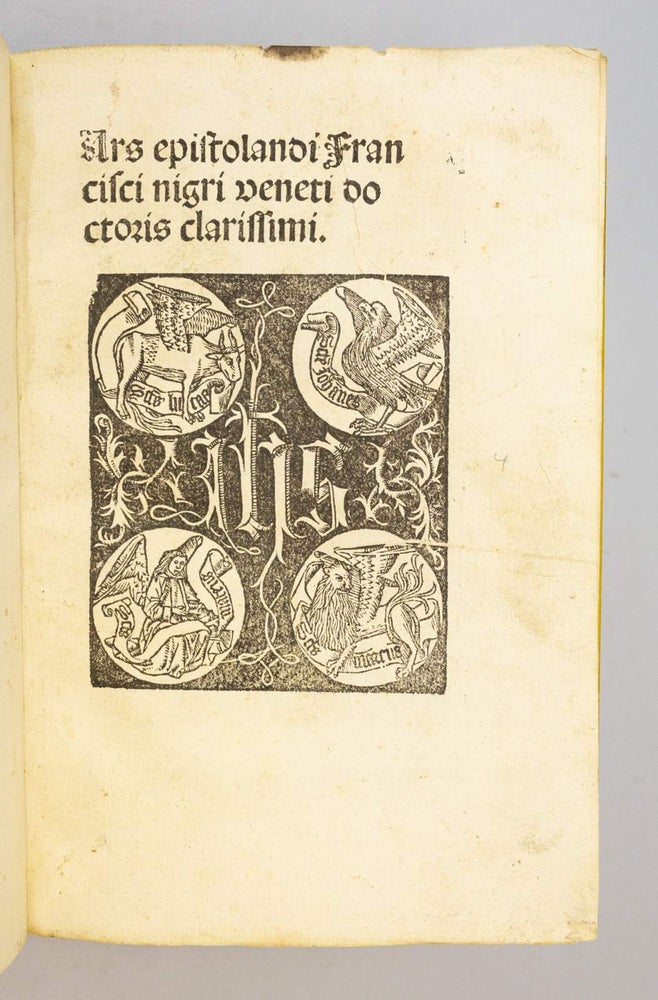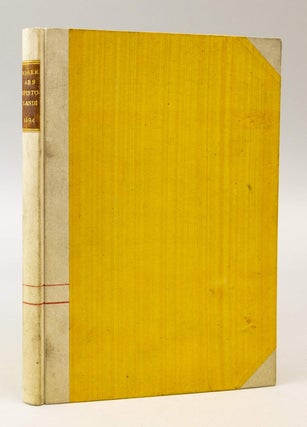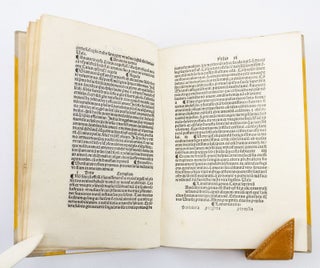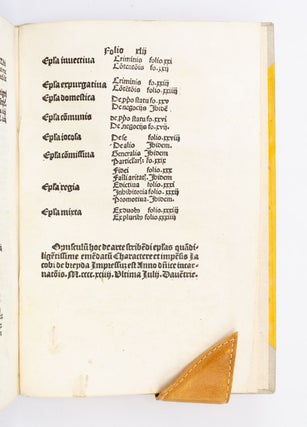ARS EPISTOLANDI FRANCISCI NIGRI VENETI DOCTORIS CLARISSIMI.
(Deventer: Jacobus de Breda, 31 July 1494). 212 x 140 mm. (8 1/4 x 5 1/2"). Complete. xlii leaves. Single column, 37 lines, gothic type.
Modern half vellum over yellow paper boards, brown morocco label, one vertical and two horizontal red-inked lines on the vellum. Printer's device with monogram of Christ and emblems of the four Evangelists on title page. BMC IX, 68; not in Goff; ISTC in00243200. ◆Minor soiling to binding, occasional minor marginal stains, other trivial imperfections, but A FINE COPY, the text quite clean and crisp, and the inoffensive binding in perfectly acceptable condition.
This is a rare Deventer edition of the guide to letter writing by Venetian humanist and grammarian Francesco Negri, a text that remained one of the most popular manuals on epistolography for a century after its first appearance in 1487. Fine epistolary style was considered an essential mark of education and good breeding in the Renaissance, and this practical handbook offers instruction on composing letters for all situations, from personal to professional, including love letters and notes of sympathy as well as formal letters of introduction, congratulation, and persuasion. The first section sets out the necessary parts of such letters, and offers examples of ideal letters (many from Cicero). This is followed by a list of rules for writing various sorts of letters. For example, a letter of recommendation should begin by praising the person to whom it is addressed, then the person being recommended, before a request is made (for employment, lodging, training, etc.), ending with an offer of some sort of recompense to the addressee. One of Niger's recommended closing phrases--the rather extreme promise of "perpetuam servitutem" ["perpetual servitude"]--lingers on in the "I remain your obedient servant" closing often used in 18th and 19th century epistles. Negri (1452-1523) was a teacher of grammar and rhetoric who served as tutor to the children of the Duke of Ferrara, Alfonso I d'Este, and his wife, Lucrezia Borgia; he is noteworthy as an author from the incunabular period who got to see his works printed in his own lifetime. Our edition was issued by the second printer in Deventer, Jacobus de Breda [Jacob van Breda] (fl. 1485-1518), who became a citizen there in 1483. In "Post-Incunabula and Their Publishers in the Low Countries," Hendrik Vervliet suggests that de Breda trained with the first printer in that city, Richard Pafraet, as the latter's types were used for de Breda's earliest efforts. The two printers both catered almost exclusively to the educational market (de Breda's press was just steps from one of the leading schools in town, run by humanist Alexander Hegius), producing classical texts and numerous works by Italian humanists like Negri. While there were quite a few printings of "Ars Epistolandi," copies from all of these editions are very rare, since this is the kind of book that would have been quickly and thoroughly worn out through repeated hard use. ISTC and OCLC do not locate a copy of the present edition in North America. Incunabular edition of the work are rare in the marketplace: ABPC and RBH find no other copy of this edition at auction since the 1930s, and just four copies printed before 1500 are recorded since 1951. (ST14931)
Price: $16,000.00




